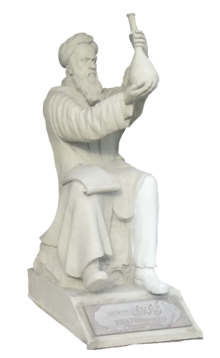แอบู แบกร์ แอล-รอซี
แอบู แบกร์ แอล-รอซี | |
|---|---|
 รูปปั้นของแอลรอซีในศาลาปราชญ์ในเวียนนา | |
| เกิด | ค.ศ. 864 หรือ 865 ฮิจเราะห์ศักราช 250 หรือ 251 ราย (อิหร่าน) |
| เสียชีวิต | 925 (อายุ 60–61) CE or 935 (อายุ 70–71) CE 313 or 323 AH ราย (อิหร่าน) |
| ยุค | ยุคทองของอิสลาม |
ความสนใจหลัก | แพทยศาสตร์, ปรัชญา, วิชาแปรธาตุ, การวิจารณ์ศาสนา |
แอบู แบกร์ แอล-รอซี (อักษรโรมัน: Abū Bakr al-Rāzī; ชื่อเต็ม: أبو بکر محمد بن زکریاء الرازي, Abū Bakr Muḥammad bin Zakariyyāʾ al-Rāzī)[a] ป. ค.ศ. 864 หรือ 865–925 หรือ 935,[b] หรือมักเรียกว่า แอลรอซี หรือชื่อละติน ราซีส (อักษรละติน: Rhazes หรือ Rhasis) เป็นนักศิลปวิทยาการชาวเปอร์เซีย[1] ผู้รู้ด้านแพทยศาสตร์, ปรัชญา และ วิชาเล่นแร่แปลธาตุ มีชีวิตอยู่ในสมัยยุคทองของอิสลาม รอซีได้รับการยอมรับให้เป็นหนึ่งในบุคคลที่มีความสำคัญที่สุดในประวัติศาสตร์การแพทย์[2] นอกจากนี้ยังมีผลงานเชียนในสาขาวิชาตรรกศาสตร์, ดาราศาสตร์ และ ไวยากรณ์[3] และเป็นที่รู้จักจากงานเขียนวิพากษ์ศาสนา โดยเฉพาะในประเด็นการเป็นผู้ส่งสาร และ การเปิดผยบางสิ่งจากพระเจ้าแก่มนุษย์[4]
แอลรอซีเป็นบุคคลแรก ๆ ที่ใช้หลักของการแพทย์เชิงทดลอง รวมถึงยังประกอบวิชาชีพเป็นหัวหน้าแพทย์ทั้งในแบกแดด และใน ราย[5][6] ในฐานะอาจารย์แพทย์ เขายังได้สอนศิษย์จากทุกภูมิหลังและทุกความสนใจ และทุ่มเทให้กับการสอนไม่ว่าศิษย์จะยากดีมีจนเช่นไร[7] ในบรรดาผลงานในสาขาแพทยศาสตร์ของเขา เขาเป็นคนแรกที่ระบุการแยกลักษณะทางคลินิกระหว่างฝีดาษ และ หัด ได้ รวมถึงยังเสนอแนวทางการรักษาฝีดาษไว้เช่นกัน[8]
งานเขียนและแนวคิดทางการแพทย์ของเขาถูกนำไปแปลและกลายมาเป็นที่รู้จักในบรรดาแพทย์ยุคกลางของยุโรป งานของเขามีอิทธิพลมากต่อวงการแพทยศาสตร์ศึกษาของโลกตะวันตกละตินในเวบานั้น[5] บางบทจากงานเขียนเล่ม Al-Mansuri ได้แก่บท "ว่าด้วยศัลยศาสตร์" และ "เล่มทั่วไปสำหรับการรักษา" กลายมาเป็นส่วนหนึ่งของการศึกษาแพทยศาสตร์ในมหาวิทยาลัยของตะวันตก[5] Edward Granville Browne ยกย่องให้เขาเป็น "น่าจะเป็นแพทย์มุสลิมที่ยิ่งใหญ่ที่สุด และเป็นต้นฉบับที่สุด และหนึ่งในนักเขียนที่ผลงานเขียนมีอิทธิพลเยอะที่สุด"[9] นอกจากนี้ เขายังได้รับการเรียกว่าเป็น "บิดาแห่งกุมารเวชศาสตร์"[10][11] รวมถึงยังมีบทบาทมากต่อแพทยศาสตร์ในสาขาสูติศาสตร์ และ จักษุวิทยา[12] หนึ่งในผลงานสำคัญของเขาคือเป็นแพทย์คนแรกที่พบและบรรยายถึงการตอบสนองของรูม่านตาต่อแสงไฟ[11]
อ้างอิง
[แก้]- ↑ For the spelling of his Arabic name, see for example Kraus 1939. Sometimes it is also spelled زکریا (Zakariyyā) rather than زکریاء (Zakariyyāʾ), as for example in Dānish-pazhūh 1964, p. 1 of the edition, or in Mohaghegh 1993, p. 5. In modern Persian his name is rendered as ابوبکر محمدبن زکریا رازی (see Dānish-pazhūh 1964, p. 1 of the introduction), though instead of زکریا one may also find زکریای (see Mohaghegh 1993, p. 18).
- ↑ For his date of birth, Kraus & Pines 1913–1936 give 864 CE / 250 AH (Goodman 1960–2007 gives 854 CE / 250 AH, but this is a typo), while Richter-Bernburg 2003 and Adamson 2021a give 865 CE / 251 AH. For his date of death as 925 or 935 CE / 313 or 323 AH, see Goodman 1960–2007; some sources only give 925 CE / 313 AH (Walker 1998; Richter-Bernburg 2003; Adamson 2021a).
- ↑ Oxford Reference 2022
Ziai 2005, p. 415
Sarton 1927, p. 587
Frye 1975, pp. 415–416
Duffin 2021, p. 74
Ullmann 1997, p. xi
Arberry 2008, p. 37 - ↑ Walker 1998; Iskandar 2008; Adamson 2021a.
- ↑ Majid Fakhry, A History of Islamic Philosophy: Third Edition, Columbia University Press (2004), p. 98.
- ↑ Adamson 2021a
- ↑ 5.0 5.1 5.2 Iskandar 2008.
- ↑ Influence of Islam on World Civilization" by Prof. Z. Ahmed, p. 127.
- ↑ Rāzī, Abū Bakr Muḥammad ibn Zakarīyā, Fuat Sezgin, Māzin ʻAmāwī, Carl Ehrig-Eggert, and E. Neubauer. Muḥammad ibn Zakarīyāʼ ar-Rāzī (d. 313/925): texts and studies. Frankfurt am Main: Institute for the History of Arabic-Islamic Science at the Johann Wolfgang Goethe University, 1999.
- ↑ ANSARI, A. S. BAZMEE (1976). "Abu Bakr Muhammad Ibn Yahya Al-Razi: Universal Scholar and Scientist". Islamic Studies. 15 (3): 155–166. ISSN 0578-8072. JSTOR 20847003.
- ↑ Browne 1921, p. 44.
- ↑ Tschanz David W., PhD (2003). "Arab(?) Roots of European Medicine". Heart Views. 4 (2).
- ↑ 11.0 11.1 Elgood, Cyril (2010). A Medical History of Persia and The Eastern Caliphate (1st ed.). London: Cambridge. pp. 202–203. ISBN 978-1-108-01588-2.
By writing a monograph on 'Diseases in Children' he may also be looked upon as the father of paediatrics.
- ↑ "Ar-Razi (Rhazes), 864-930 C.E." www.unhas.ac.id. คลังข้อมูลเก่าเก็บจากแหล่งเดิมเมื่อ 20 February 2020. สืบค้นเมื่อ 2020-02-27.
Ar-Razi was a pioneer in many areas of medicine and treatment and the health sciences in general. In particular, he was a pioneer in the fields of pediatrics, obstetrics and ophthalmology.
บรรณานุกรม
[แก้]- Adamson, Peter (2021a). "Abu Bakr al-Razi". ใน Zalta, Edward N. (บ.ก.). The Stanford Encyclopedia of Philosophy.
- Arberry, Arthur John (2008). Revelation and Reason in Islam. Routledge. ISBN 9780415438872.
- Browne, Edward G. (1921). Arabian Medicine, Being the Fitzpatrick Lectures Delivered at the College of Physicians in November 1919 and November 1920. Cambridge: Cambridge University Press. pp. 44–53. OCLC 808169546.
- Dhanani, Alnoor (2013). "Atomism". ใน Fleet, Kate; Krämer, Gudrun; Matringe, Denis; Nawas, John; Rowson, Everett (บ.ก.). Encyclopaedia of Islam, Three. doi:10.1163/1573-3912_ei3_COM_24249.
- Duffin, Jacalyn (2021). History of Medicine: A Scandalously Short Introduction (3rd ed.). University of Toronto Press. ISBN 978-1-4875-0917-0.
- Frye, Richard N. (1975). The Cambridge history of Iran, Volume 4 (Reprint ed.). London: Cambridge University Press. ISBN 978-0-521-20093-6.
- Goodman, L.E (1960–2007). "al-Rāzī". ใน Bearman, P.; Bianquis, Th.; Bosworth, C.E.; van Donzel, E.; Heinrichs, W.P. (บ.ก.). Encyclopaedia of Islam, Second Edition. doi:10.1163/1573-3912_islam_SIM_6267.
- Hitti, Philip Khuri (January 1, 1969). Makers of Arab History. St. Martin's Press.
- Iskandar, Albert Z. (2008). "Al-Rāzī". ใน Selin, Helaine (บ.ก.). Encyclopaedia of the History of Science, Technology, and Medicine in Non-Western Cultures (2nd ed.). Berlin: Springer. pp. 155–156. ISBN 978-1-4020-4559-2.
- Kahl, Oliver (2015). The Sanskrit, Syriac and Persian Sources in the Comprehensive Book of Rhazes. BRILL. ISBN 978-90-04-29024-2.
- Oxford Reference (2022). "Abu Bakr Muhammad ibn Zakariyya al- Razi". Oxford Reference (ภาษาอังกฤษ). สืบค้นเมื่อ 2022-03-03.
- Kraus, Paul; Pines, Shlomo (1913–1936). "al-Rāzī". ใน Houtsma, M. Th.; Arnold, T.W.; Basset, R.; Hartmann, R. (บ.ก.). Encyclopaedia of Islam, First Edition (1913-1936). doi:10.1163/2214-871X_ei1_SIM_3693.
- Walzer, Richard (1962). Greek Into Arabic Essays on Islamic Philosophy (Oriental Studies I ed.). Harvard University Press. ISBN 978-0674362758.
- Richter-Bernburg, Lutz (2003). "Ḥāwi, al-". ใน Yarshater, Ehsan (บ.ก.). Encyclopædia Iranica, Volume XII/1: Harem I–Hedāyat al-mota'allemin. London and New York: Routledge & Kegan Paul. pp. 64–67. ISBN 978-0-933273-74-0.
- Sarton, George (1927). Introduction to the History of Science, Volume 1. ISBN 978-0443092060.
- Stroumsa, Sarah Stroumsa (1999). Freethinkers of Medieval Islam: Ibn al-Rāwandī, Abū Bakr al-Rāzī, and Their Impact on Islamic Thought. Islamic Philosophy, Theology and Science. Texts and Studies. Vol. 35. Leiden: Brill. ISBN 978-90-04-11374-9.
- Ullmann, Manfred (February 1997). Islamic Medicine. Edinburgh University Press. ISBN 9780748609079.
- Walker, Paul E. (1998). "al-Razi, Abu Bakr Muhammad ibn Zakariyya' (d. 925)". ใน Craig, Edward (บ.ก.). Routledge Encyclopedia of Philosophy. doi:10.4324/9780415249126-H043-1. ISBN 9780415250696.
- Ziai, Hossein (2005). "Recent trends in Arabic and Persian philosophy". ใน Adamson, Peter; Taylor, Richard C. (บ.ก.). The Cambridge Companion to Arabic Philosophy. Cambridge: Cambridge University Press. pp. 405–425. ISBN 978-0521520690.
